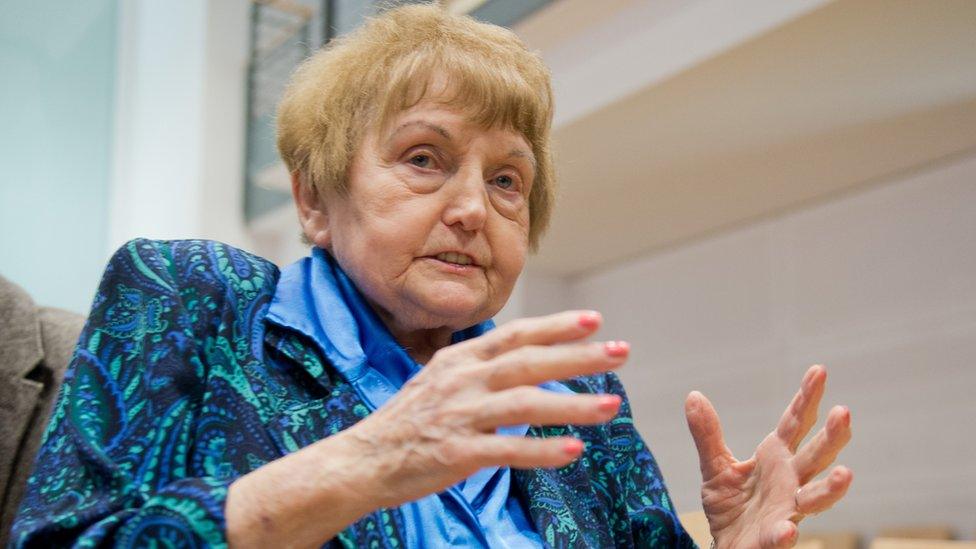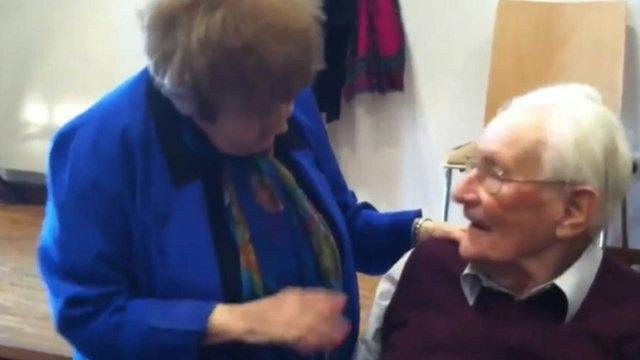Eva Kor: Auschwitz survivor of Mengele Nazi torture dies
- Published
Auschwitz survivor Eva Kor called for forgiveness even for Nazi crimes
Eva Kor survived the Holocaust and went on to call for forgiveness of Nazi perpetrators, giving tours of the death camp at Auschwitz.
She set up a small Holocaust museum in her adoptive home in the US and has died aged 85, during one of her annual trips to Poland.
Eva Mozes Kor was born in Romania and was deported with her Jewish family to Auschwitz in 1944.
Unlike the rest of her family, she and her twin sister Miriam survived.
But they were brutally abused by the notorious Josef Mengele, known as the Angel of Death, who was involved in selecting for death many of the 1.1 million Jews murdered in the gas chambers. The Nazis murdered six million Jews in World War Two.
As a doctor at Auschwitz from 1943, Mengele carried out torture on more than 1,000 twins and other Auschwitz prisoners as part of his warped idea of science.
"Three times a week we went to the blood lab. There we were injected with germs and chemicals and they took a lot of blood from us," she said in 2001. She developed a high fever and was given two weeks to live, but eventually recovered.
Mengele disappeared after the war and DNA tests later confirmed that he had drowned in Brazil in 1979.
Life after the war
The sisters were liberated shortly before their 11th birthday and left for Israel, where Eva later married an American and moved to Terre Haute in the US state of Indiana.
In 1985 she set up the Candles Holocaust Museum and Education Center, external. The museum said she had been spurred into action by the landmark US TV drama, Holocaust, which was shown in Germany and many other countries.

Eva Kor moved to the US but travelled every year to site of the Nazi death camp at Auschwitz
Her sister died in 1993 after a life of health difficulties she had suffered since Auschwitz.
Eva also suffered from health problems after the war but spent her final years giving talks about Auschwitz and returning to the site of the former death camp every year.
Encounter at Nazi trial
In 2015, she attended the German trial of former Auschwitz guard Oskar Gröning, known as the book-keeper of Auschwitz as he was responsible for counting the belongings confiscated from prisoners.
She approached Gröning and shook his hand and he responded by kissing her on the cheek.
Allow X content?
This article contains content provided by X. We ask for your permission before anything is loaded, as they may be using cookies and other technologies. You may want to read X’s cookie policy, external and privacy policy, external before accepting. To view this content choose ‘accept and continue’.

Gröning was eventually jailed for four years for being an accessory to the murder of at least 300,000 people.
The museum Kor set up in Terre Haute announced she had died in Krakow on Thursday morning, adding she had touched the lives of thousands of people "through her message of overcoming tragedy, finding forgiveness, and healing".
In a Facebook statement, the museum said that one of the themes of her life was that forgiveness can help to heal.
- Published15 July 2015
